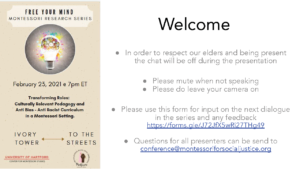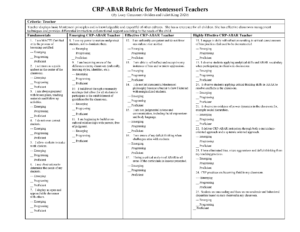Multimedia Resources
Webinars
Introduction to Montessori Education
A history of Montessori education as presented by Gerry Leonard, AMI Director of Training
Guiding the Writing Process
Learn more about the writing process and how it unfolds in a Montessori Primary environment as presented by Gretchen Hall, AMI Director of Training.
The Art of Story Telling in the Montessori Elementary Classroom
Learn about the importance of story telling for the 6-12 year old, guidelines for writing your own stories, and becoming a good story teller. This webinar is ideal for anyone who is interested in learning more about Montessori theories and practices used in the classroom as presented by Gerry Leonard, AMI Director of Training.
Spontaneous Reading: A Joyful Journey
AMI Director of Training, Gretchen Hall, shares how to identify the skills necessary for becoming a reader and how to align these skills to the Montessori materials, as she reviews the progression that leads to spontaneous reading. You will come away with proven techniques and strategies for developing the reading skills of children that can be used immediately in your classroom.
Helping Children Feel at Home in the Natural World – the Montessori Approach
AMI Director of Training, Gerry Leonard, discusses why Maria Montessori promoted children not only understanding how the natural world works, that is the laws of nature, but why she also promoted what she called “living in nature”. During the webinar recent writing regarding “nature deficit disorder” is reviewed, and practical ways to connect children to the natural world, both in school and at home, are shared.
Quality Montessori in the Public Sector
An overview on quality Montessori in the public sector presented by Tim Nee.
Quality Montessori: The Essential Elements
Tim Nee provides an overview of the Essential Elements for Quality Montessori in the Public Sector. The elements have been agreed upon by multiple organizations including both AMI and AMS. These elements are an excellent way for schools to evaluate their own Montessori programs, create school improvement plans and/or provide professional development to their Montessori community.
Montessori and the Current Early Childhood Landscape
This webinar addresses Montessori theory and practice in the current early childhood education landscape with special attention to this child-centered practice and sustained work by children.
Human Responsibility: Seeing Resourced Community and Human Capacity
Families have many kinds of assets. As educators, especially working with families and children birth to age three, we have a precious opportunity to celebrate each child’s capacity and family’s assets. From Mexico to Hartford, USA and through Montessori and Birth to Three System work, we are preparing the next generation of early care providers. This is a recorded webinar presented by Dora Maria Vidales, AMI Montessori Assistant to Infancy Trainer, Courtney Reim, AMI Montessori Primary Trained Guide, with Drs. Lynn Johnson and Paige M. Bray from the University of Hartford.
Research and Advocacy: Montessori Teacher Experiences and Professional Pathways
Learn about research illuminating the Montessori teacher experience, explore the data that informs professional pathways, including state licensure, and find out more about the ways advocates use data to call for further research. Presented by Dr. Paige Bray and Dr. Joshua Russell.
Montessori Research: Why You Should Care and Contribute
This recorded webinar focuses on the recent research completed by Angeline Lillard and her colleagues where it was found that Montessori preschool boosts academic results and reduces income-based inequality.
Montessori Education: The Role and Application of Quality Participatory Action Research
Dr. Paige Bray and Dr. Joshua Russell provide an introduction to the role of quality participatory action research as applied in educational research and specifically in Montessori education.
Montessori: A Multi-Media Introduction
Find out what Montessori is all about through Multi-Media. And, did you know Montessori’s developmental approach is used with infants and throughout life, including elders? See Montessori methods being using in schools, community settings, health care around the world. There are MultiMedia compilations for you to share with friends, families and students of all ages! This webinar is presented by Dr. Paige M. Bray and guests.
Why is Geometry So Important?
This webinar, presented by Gerard (Gerry) Leonard, focuses on the Montessori approach to Geometry as a aid to child development. He examines a number of explorations and discoveries that children make using geometry materials and discusses how such hands-on work in the discipline of geometry builds the child’s reasoning mind.
From Oops to Aha: Portraits of Learning From Mistakes in Kindergarten with Dr. Maleka Donaldson
In this webinar Dr. Melaka Donaldson discusses her published sole-authored book, From Oops to Aha: Portraits of Learning From Mistakes in Kindergarten. In viewing this webinar you will learn how teachers from four public school Kindergarten classrooms: urban, charter, Montessori, and suburban respond to mistakes and interact with students. Dr. Donaldson’s shares how teachers’ beliefs, intentions, and instructional practices play out in context during daily life and the associated policy implications.
Dr. Maleka Donaldson, Assistant Professor of Education & Child Study, Smith College: Maleka Donaldson’s courses focus on the learning sciences and on STEM teaching methods at the elementary level. In her research, she studies teacher and student responses to making mistakes, including how classroom interactions shape instruction in real-world contexts. Donaldson’s work appears in several peer-reviewed journals and her published, sole-authored book, From Oops to Aha: Portraits of Learning From Mistakes in Kindergarten.


